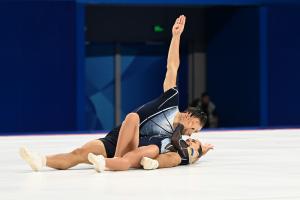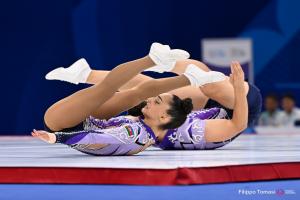This website uses cookies. By continuing to use our site you are agreeing to our use of cookies.
For more details about cookies and how to manage them see our privacy policy.
Preview of the Men’s Artistic Gymnastics competition at #Paris2024
The 33rd edition of the Olympic Games will be held in the French capital Paris from Friday 26 July till Sunday 11 August.
It’s the third time Paris welcomes the Games, after 1900 and 1924. 10,500 athletes from all 206 National Olympic Committees will participate, including 324 gymnasts!
Gymnastics fact sheet
|
13 |
Competition Days |
|
196 |
Artistic gymnasts |
|
32 |
Trampoline gymnasts |
|
96 |
Rhythmic gymnasts |
|
18 |
Medal sets |
Who to watch
Records are bound to be broken in Paris! For Great Britain, triple Olympic Champion Max Whitlock aims to add more trophies to his extensive collection. Should he medal, he will become the first artistic gymnast, from any nation, to medal at four consecutive Olympics. Gold on pommel horse can make him the only male gymnast to win three in a row. Whitlock is joined by World Champion teammate Jake Jarman, European floor Champion Luke Whitehouse, 2022 European all-around champion Joe Fraser and Harry Hepworth.
The proud owner of two World and 3 European titles on pommel horse, Rhys McClenaghan has Ireland’s hopes on his shoulders. Finalist at Tokyo 2020, the 25-year-old Irishman aims for a medal on his signature apparatus, and has looked calm and confident in the lead-up to the Games.
At this year’s European Championships in Rimini, Eleftherios Petrounias became the sole gymnast to hold 7 European titles on a single apparatus. Well acquainted with Olympic success already, the Greek Lord of the Rings won gold at Rio 2016, and bronze in Tokyo. Can he regain the title or complete the set, we‘ll soon see at the iconic Bercy arena.
On hand to defend his Olympic floor title is Israel’s Artem Dolgopyat, who currently also holds the world title. As does Lukas Dauser on parallel bars. The German star is back in top shape and looking for another Olympic medal, hoping to upgrade from the silver won in Tokyo. With Dauser on the podium in Tokyo, Ferhat Arican wrote history then by winning Türkiye’s first Olympic medal in gymnastics, a feat he’s keen to repeat.
The title of ultimate star of the European Championships clearly went to Illia Kovtun. At still only 20 years old, the talented Ukrainian topped the standing on both parallel bars and horizontal bar, before leading his team to the European crown. Acing his many World Cup performances this year, Kovtun is eager to shine in the City of Light.
More European stand outs to keep your eye on: Croatia’s Tin Srbic, Armenian brothers Vagahn and Artur Davtyan, Rayderley Zapata for Spain, 2023 European all-around Champion Adem Asil (TUR), current European all-around Champion, the history-making Cypriot Marios Georgiou, Italy’s Nicola Bartolini, and many many others.
Outside of Europe, Japan and China are the main powerhouses, with USA and Canada ready to battle for medals as well. Japan’s Daiki Hashimoto is the defending Olympic all-around Champion, looking to lead his team to the podium yet again.
Competition kicks off on Saturday!
European participants
Europe will be represented by 8 teams featuring 5 gymnasts each, and 16 individuals.
Teams
Great Britain: Max Whitlock, Joe Fraser, Harry Hepworth, Jake Jarman and Luke Whitehouse
Germany: Andreas Toba, Nils Dunkel, Pascal Brendel, Timo Eder and Lukas Dauser
Italy: Carlo Macchini, Yumin Abbadini, Nicola Bartolini, Lorenzo Minh Casali and Mario Macchiati
Switzerland: Luca Giubellini, Matteo Giubellini, Florian Langenegger, Noe Seifert and Taha Serhani
Spain: Nestor Abad, Joel Plata, Thierno Diallo, Nicolau Mir and Rayderley Zapata
Türkiye: Ahmet Onder, Adem Asil, Emre Dodanli, Ferhat Arican and Ibrahim Colak
Netherlands: Frank Rijken, Martijn De Veer, Jermain Gruenberg, Loran De Munck and Casimir Schmidt
Ukraine: Illia Kovtun, Oleg Verniaiev, Nazar Chepurnyi, Radomyr Stelmakh and Igor Radivilov
Individuals
Glen Cuyle (BEL)
Artem Dolgopyat (ISR)
Artur Davtyan (ARM)
Krisztofer Meszaros (HUN)
Luka Van den Keybus (BEL)
Andrei Vasile Muntean (ROU)
Rhys McClenaghan (IRL)
Eleftherios Petrounias (GRE)
Kevin Penev (BUL)
Noah Kuavita (BEL)
Tin Srbic (CRO)
Aurel Benovic (CRO)
Vahagn Davtyan (ARM)
Samir Ait Said (FRA)
Robert Tvorogal (LTU)
Marios Georgiou (CYP)
Check out the full participants list: FIG - Event Detail - 17041 (gymnastics.sport)
Schedule – All times in Paris (FRA) local time zone CEST
Saturday 27 July
11:00 – 13:30 Qualifications Subdivision 1
15:30 – 18:00 Qualifications Subdivision 2
20:00 – 22:30 Qualifications Subdivision 3
Monday 29 July
17:30 – 20:30 Team Final
Wednesday 31 July
17:30 – 20:15 All-Around Final
Saturday 3 August
15:30 – 16:15 Floor exercise Final
17:15 – 18:30 Pommel horse Final
Sunday 4 August
15:00 – 15:40 Rings Final
16:24 – 17:15 Vault Final
Monday 5 August
11:45 – 12:35 Parallel bars Final
13:30 – 14:20 Horizontal bar Final
Competition format
In qualification, a team consists of 5 gymnasts, 4 perform per apparatus and the three best scores count towards the team total. The eight best nations advance to the Team Final where 3 gymnasts perform per apparatus and all three scores count towards the total score.
The 24 best all-around gymnasts in the qualification round, with a maximum of 2 per country, advance to the All-Around Final. The 8 best per apparatus, again with a maximum of 2 per country, will compete in the respective Apparatus Finals.
In Men’s Artistic Gymnastics, there are 8 medal opportunities: Team, All-Around, Floor, Pommel horse, Rings, Vault, Parallel bars, and Horizontal bar.
How to follow
The Olympic Games will be broadcast internationally on all major TV channels. Check your local TV listing for detailed information.
European Gymnastics will provide social media coverage, and photo albums and competition reports on its website.


